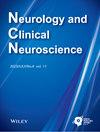Pseudohyperkalemia in myotonic dystrophy type 1: A case report
IF 0.4
Q4 CLINICAL NEUROLOGY
引用次数: 0
Abstract
Myotonic dystrophy type 1 (DM1) is an autosomal dominant familial muscular dystrophy caused by abnormal CTG repeat expansion in the myotonic dystrophy protein kinase (DMPK) gene. The cardinal features of DM1 patients are muscular weakness, myotonia, and arrhythmia. DM1 patients with electrolyte imbalance caused by endocrinological alterations have also been reported. Herein, we report a female patient with DM1 and hyperkalemia, which fluctuated depending on the blood collection methods. We revealed that cold stimulation of red blood cells was associated with hyperkalemia, whereas blood examination immediately after collection showed normal potassium levels. She was, therefore, diagnosed with pseudohyperkalemia. Several previous reports have described DM1 patients with pseudohyperkalemia, similar to ours. Neurologists should be aware that some patients with DM1 may have pseudohyperkalemia. Thus, consider retesting with prompt measurement after blood collection to rule out pseudohyperkalemia when a patient shows hyperkalemia. If confirmed, evaluate for DM1 as a potential differential diagnosis.1 型肌营养不良症假性高钾血症:病例报告
肌营养不良症 1 型(DM1)是一种常染色体显性家族性肌营养不良症,由肌营养不良症蛋白激酶(DMPK)基因 CTG 重复异常扩增引起。DM1 患者的主要特征是肌肉无力、肌强直和心律失常。内分泌改变导致电解质失衡的 DM1 患者也有报道。在此,我们报告了一名女性 DM1 患者和高钾血症,高钾血症随采血方法的不同而波动。我们发现,冷刺激红细胞与高钾血症有关,而采血后立即进行的血液检查显示血钾水平正常。因此,她被诊断为假性高钾血症。之前有几份报告描述了与我们类似的假性高钾血症的 DM1 患者。神经科医生应该意识到,一些DM1患者可能患有假性高钾血症。因此,当患者出现高钾血症时,应考虑在采血后及时进行复测,以排除假性高钾血症。如果确诊,应将 DM1 作为潜在的鉴别诊断进行评估。
本文章由计算机程序翻译,如有差异,请以英文原文为准。
求助全文
约1分钟内获得全文
求助全文

 求助内容:
求助内容: 应助结果提醒方式:
应助结果提醒方式:


